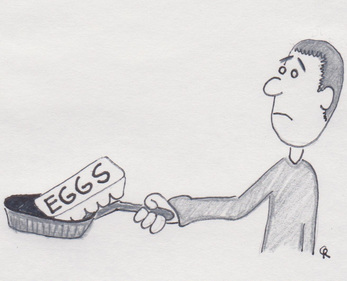
On September 5, 2011, the NY Times op-ed piece by Helen Zoe Veit, an assistant professor of history at Michigan State University, and the author of the forthcoming “Victory Over Ourselves: American Food in the Era of the Great War,” suggested that we might have a chance against the obesity epidemic if we revived home economics in the schools.
She stated that, “Too many Americans simply don’t know how to cook. Our diets, consisting of highly processed foods made cheaply outside the home thanks to subsidized corn and soy, have contributed to an enormous health crisis. More than half of all adults and more than a third of all children are overweight or obese. Chronic diseases associated with weight gain, like heart disease and diabetes, are hobbling more and more Americans.”
Recently, while driving on 101, a billboard caught my eye. It advertised a $1.00 breakfast at a fast food chain. I checked it out, thinking that maybe one of the items would be granola or fruit. Nope! It’s hard to compete with that, when you are hungry and on the run. I also found that they had a similar menu for the rest of the day. A salad was one of the options. Why would anyone in the United States ever have to cook oatmeal or a colorful vegetable soup?
Professor Veit reported, “In the last decade, many cities and states have tried — and generally failed — to tax junk food or to ban the use of food stamps to buy soda. Clearly, many people are leery of any governmental steps to promote healthy eating; Michelle Obama’s campaign against childhood obesity has inspired panic about a secret food police.”
A few days later, I was driving again and listening to NPR. The guests, Roy F. Baumeister and John Tierney were discussing their new book, Willpower, Rediscovering the Greatest Human Strength. (Incidentally, I exerted no willpower, but went home and immediately ordered the book.)
That was one of their points. It’s hard to have an iron will when there are so many distractions out there – online shopping, emails to answer, websites to browse… They talked about how daily challenges and decision-making require willpower, so over time we become worn down and may have less control. On the positive side, routines conserve willpower.
They related an interesting study done in the 1960s at Stanford. Miscel looked at how a child learns to resist immediate gratification. Four year-olds were brought into a room one at a time, shown a marshmallow and offered a deal. Leaving them in the room alone, the child could eat the marshmallow whenever they wanted, but if they waited the 15 minutes until the researcher returned, they could have two marshmallows! Some gobbled immediately. Some struggled but couldn’t hold out. But some waited, distracting themselves with other activities.
Years later, Miscel looked at where his subjects, now adults, were in their lives. He found that those who hadn’t waited had gotten into more trouble both in and out of school. The ones who had shown the most willpower at age 4, went on to get better grades and higher SAT scores. They were more popular with their peers and teachers, earned higher salaries, had a lower BMI, and had fewer problems with drug abuse.
Inevitably the conversation with the authors moved to dieting and weight loss. They pointed out that the brain needs glucose to function, to make decisions. So how do you get that sustained glucose in the brain? Are you picturing that bowl of M&Ms you like to have around while you are working on a difficult project?
“Don’t try to exert willpower all day long on an empty stomach,” they warned.
“In order not to eat a dieter needs willpower. In order to have willpower one needs to eat.” The mere act of resisting temptation wears down your willpower, they said.
Regular healthful eating keeps the brain functioning, which brings me back to
Home Economics or as it is now called Family and Consumer Science. Since the 20th Century the discipline has been linked to chemistry, biology and bacteriology, not marshmallow fluff!
Some 4 year olds showed us what willpower is all about. So let’s consider professor Veit’s idea and put the tools of obesity prevention in the hands of those who will affect the future of healthful eating – young people themselves.
And the next time you make a meal from scratch, bring the kids in the kitchen. They might just get interested.
 RSS Feed
RSS Feed
